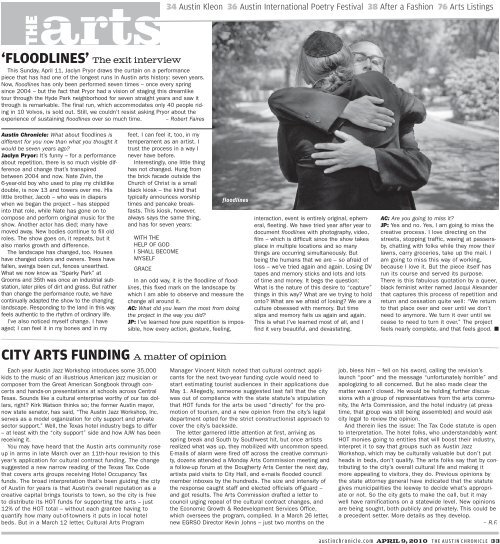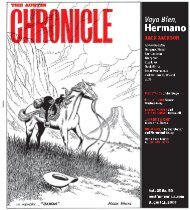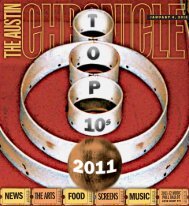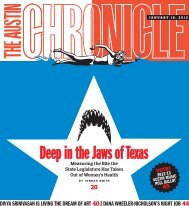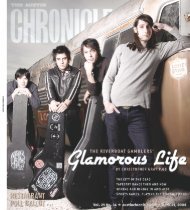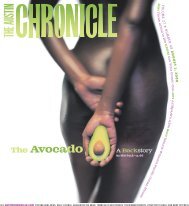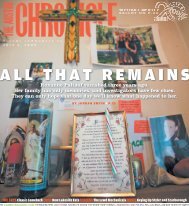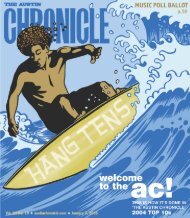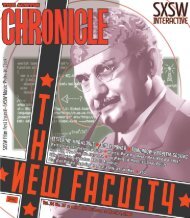R E S T A U R A N T P O L L B A L L O T P . 4 6 - The Austin Chronicle
R E S T A U R A N T P O L L B A L L O T P . 4 6 - The Austin Chronicle
R E S T A U R A N T P O L L B A L L O T P . 4 6 - The Austin Chronicle
- No tags were found...
You also want an ePaper? Increase the reach of your titles
YUMPU automatically turns print PDFs into web optimized ePapers that Google loves.
THEarts34 <strong>Austin</strong> Kleon 36 <strong>Austin</strong> International Poetry Festival 38 After a Fashion 76 Arts Listings‘FLOODLINES’ <strong>The</strong> exit interviewThis Sunday, April 11, Jaclyn Pryor draws the curtain on a performancepiece that has had one of the longest runs in <strong>Austin</strong> arts history: seven years.Now, floodlines has only been performed seven times – once every springsince 2004 – but the fact that Pryor had a vision of staging this dreamliketour through the Hyde Park neighborhood for seven straight years and saw itthrough is remarkable. <strong>The</strong> final run, which accommodates only 40 people ridingin 10 Volvos, is sold out. Still, we couldn’t resist asking Pryor about theexperience of sustaining floodlines over so much time. – Robert Faires<strong>Austin</strong> <strong>Chronicle</strong>: What about floodlines isdifferent for you now than what you thought itwould be seven years ago?Jaclyn Pryor: It’s funny – for a performanceabout repetition, there is so much visible differenceand change that’s transpiredbetween 2004 and now. Nate Zivin, the6-year-old boy who used to play my childlikedouble, is now 13 and towers over me. Hislittle brother, Jacob – who was in diaperswhen we began the project – has steppedinto that role, while Nate has gone on tocompose and perform original music for theshow. Another actor has died; many havemoved away. New bodies continue to fill oldroles. <strong>The</strong> show goes on, it repeats, but italso marks growth and difference.<strong>The</strong> landscape has changed, too. Houseshave changed colors and owners. Trees havefallen, swings been cut, fences unearthed.What we now know as “Sparky Park” atGrooms and 35th was once an industrial substation,later piles of dirt and grass. But ratherthan change the performance route, we havecontinually adapted the show to the changinglandscape. Responding to the land in this wayfeels authentic to the rhythm of ordinary life.I’ve also noticed myself change. I haveaged; I can feel it in my bones and in myfeet. I can feel it, too, in mytemperament as an artist. Itrust the process in a way Inever have before.Interestingly, one little thinghas not changed. Hung fromthe brick facade outside theChurch of Christ is a smallblack kiosk – the kind thattypically announces worshiptimes and pancake breakfasts.This kiosk, however,always says the same thing,and has for seven years:WITH THEHELP OF GODI SHALL BECOMEMYSELFGRACEfloodlinesIn an odd way, it is the floodline of floodlines,this fixed mark on the landscape bywhich I am able to observe and measure thechange all around it.AC: What did you learn the most from doingthe project in the way you did?JP: I’ve learned how pure repetition is impossible,how every action, gesture, feeling,interaction, event is entirely original, ephemeral,fleeting. We have tried year after year todocument floodlines with photography, video,film – which is difficult since the show takesplace in multiple locations and so manythings are occurring simultaneously. Butbeing the humans that we are – so afraid ofloss – we’ve tried again and again. Losing DVtapes and memory sticks and lots and lotsof time and money. It begs the question:What is the nature of this desire to “capture”things in this way? What are we trying to holdonto? What are we afraid of losing? We are aculture obsessed with memory. But timeslips and memory fails us again and again.This is what I’ve learned most of all, and Ifind it very beautiful, and devastating.AC: Are you going to miss it?JP: Yes and no. Yes, I am going to miss thecreative process. I love directing on thestreets, stopping traffic, waving at passersby,chatting with folks while they mow theirlawns, carry groceries, take up the mail. Iam going to miss this way of working,because I love it. But the piece itself hasrun its course and served its purpose.<strong>The</strong>re is this fabulous quotation by a queer,black feminist writer named Jacqui Alexanderthat captures this process of repetition andreturn and cessation quite well: “We returnto that place over and over until we don’tneed to anymore. We turn it over until wecease to need to turn it over.” <strong>The</strong> projectfeels nearly complete, and that feels good. CITY ARTS FUNDING A matter of opinionEach year <strong>Austin</strong> Jazz Workshop introduces some 35,000kids to the music of an illustrious American jazz musician orcomposer from the Great American Songbook through concertsand hands-on presentations at schools across CentralTexas. Sounds like a cultural enterprise worthy of our tax dollars,right? Kirk Watson thinks so; the former <strong>Austin</strong> mayor,now state senator, has said, “<strong>The</strong> <strong>Austin</strong> Jazz Workshop, Inc.serves as a model organization for city support and privatesector support.” Well, the Texas hotel industry begs to differ– at least with the “city support” side and how AJW has beenreceiving it.You may have heard that the <strong>Austin</strong> arts community roseup in arms in late March over an 11th-hour revision to thisyear’s application for cultural contract funding. <strong>The</strong> changesuggested a new narrow reading of the Texas Tax Codethat covers arts groups receiving Hotel Occupancy Taxfunds. <strong>The</strong> broad interpretation that’s been guiding the cityof <strong>Austin</strong> for years is that <strong>Austin</strong>’s overall reputation as acreative capital brings tourists to town, so the city is freeto distribute its HOT funds for supporting the arts – just12% of the HOT total – without each grantee having toquantify how many out-of-towners it puts in local hotelbeds. But in a March 12 letter, Cultural Arts ProgramManager Vincent Kitch noted that cultural contract applicantsfor the next two-year funding cycle would need tostart estimating tourist audiences in their applications dueMay 1. Allegedly, someone suggested last fall that the citywas out of compliance with the state statute’s stipulationthat HOT funds for the arts be used “directly” for the promotionof tourism, and a new opinion from the city’s legaldepartment opted for the strict constructionist approach tocover the city’s backside.<strong>The</strong> letter garnered little attention at first, arriving asspring break and South by Southwest hit, but once artistsrealized what was up, they mobilized with uncommon speed.E-mails of alarm were fired off across the creative community,dozens attended a Monday Arts Commission meeting anda follow-up forum at the Dougherty Arts Center the next day,artists paid visits to City Hall, and e-mails flooded councilmember inboxes by the hundreds. <strong>The</strong> size and intensity ofthe response caught staff and elected officials off-guard –and got results. <strong>The</strong> Arts Commission drafted a letter tocouncil urging repeal of the cultural contract changes, andthe Economic Growth & Redevelopment Services Office,which oversees the program, complied. In a March 26 letter,new EGRSO Director Kevin Johns – just two months on thejob, bless him – fell on his sword, calling the revision’slaunch “poor” and the message “unfortunately horrible” andapologizing to all concerned. But he also made clear thematter wasn’t closed. He would be holding further discussionswith a group of representatives from the arts community,the Arts Commission, and the hotel industry (at presstime, that group was still being assembled) and would askcity legal to review the opinion.And therein lies the issue: <strong>The</strong> Tax Code statute is opento interpretation. <strong>The</strong> hotel folks, who understandably wantHOT monies going to entities that will boost their industry,interpret it to say that groups such as <strong>Austin</strong> JazzWorkshop, which may be culturally valuable but don’t putheads in beds, don’t qualify. <strong>The</strong> arts folks say that by contributingto the city’s overall cultural life and making itmore appealing to visitors, they do. Previous opinions bythe state attorney general have indicated that the statutegives municipalities the leeway to decide what’s appropriateor not. So the city gets to make the call, but it maywell have ramifications on a statewide level. New opinionsare being sought, both publicly and privately. This could bea precedent setter. More details as they develop.– R.F.a u s t i n c h r o n i c l e . c o m APRIL 9, 2010 T H E A U S T I N C H R O N I C L E 33


